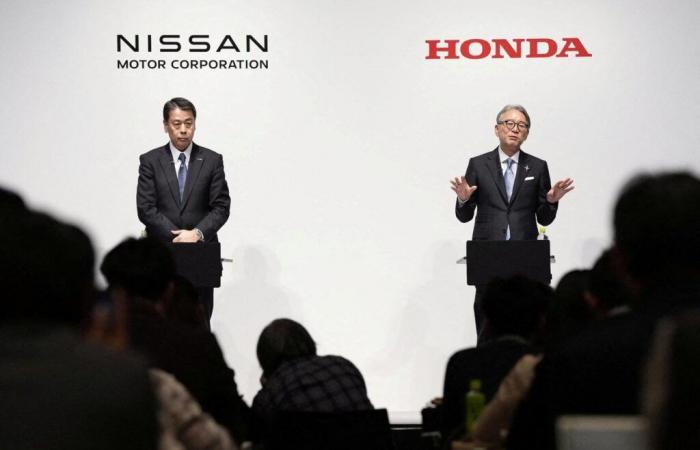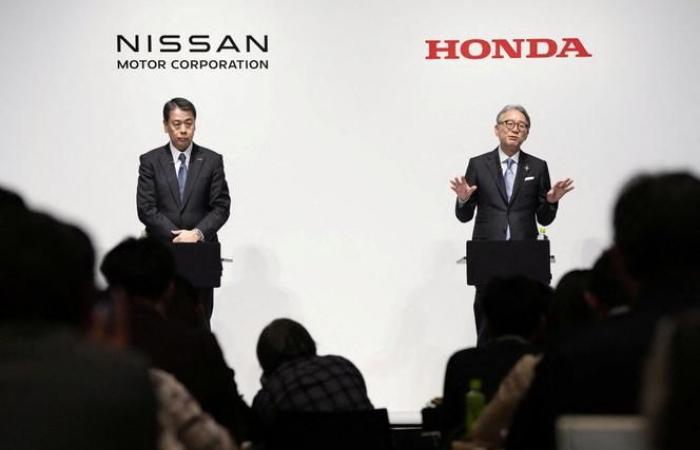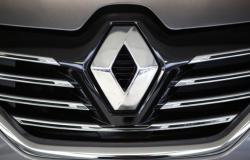The merger between the two Japanese automobile companies Honda and Nissan is coming back to the forefront. According to the economic daily Nikkei, the two manufacturers will begin talks to operate under a single holding company and will soon sign a memorandum of understanding for the new entity.
“As we announced in March and August, we are discussing possibilities for cooperation with Nissan in many areas” and a possible merger “is among the possibilities”reacted on Wednesday, December 18, a Honda spokesperson to Agence France-Presse. “But nothing is decided”he insisted. “Honda and Nissan are exploring various possibilities for collaboration, to leverage their respective strengths”Nissan simply reacted, for its part.
Honda and Nissan are respectively the second and third largest Japanese automakers behind Toyota. They plan to include Mitsubishi Motors – of which Nissan is the main shareholder – within the holding company, to give birth to one of the largest automobile groups in the world behind their compatriot Toyota and the German Volkswagen, specifies Nikkei. Between them, they sold 4 million vehicles in the first half, which remains well below the 5.16 million sold by Toyota, the world number one.
The “main object” talks are between Nissan and Honda, with Mitsubishi’s involvement being “at a different level”tempered the Honda spokesperson.
In our archives: Japan wants to marry Honda and Nissan
Read later
Nissan’s stock soars
Nissan’s stock was temporarily suspended on Wednesday on the Tokyo Stock Exchange before taking off: it climbed 23.69% around 4:15 a.m. GMT (5:15 a.m. in Paris), reaching the maximum ceiling. At the same time, Mitsubishi climbed 19.64% and Honda fell 2.80%.
This merger, if confirmed, comes at a time when Nissan is experiencing profound difficulties: the group announced at the beginning of November that it was going to cut 9,000 positions from its global workforce and cut its production capacities to adapt to a clear decline in its sales. The group is struggling to stem its sharp decline in its flagship markets, in the United States and especially in China, where its sales collapsed by 13% in the July-September quarter, facing stiff competition from Chinese manufacturers, leaders in the sector. ‘electric.
Read also | Article reserved for our subscribers Japanese Nissan announces massive restructuring
Read later
Honda and Nissan had already announced in March a memorandum of understanding for a “strategic partnership” in electric vehicles and other areas: they particularly wanted to explore collaboration prospects in software platforms, key components for electrified vehicles and other complementary products.
The choice of hybrid rather than all-electric
Japanese manufacturers are seeking to quickly strengthen their position in the electric sector, a market whose global takeoff in recent years, especially in China and Europe, has overtaken them. However, Japanese groups had chosen to focus instead on hybrid vehicles, which combine thermal and electric engines. Hybrids have proven very popular in Japan, accounting for 40% of sales in 2022 in the archipelago. Only 1.7% of cars sold in Japan that year were electric, compared to 15% in Western Europe and 5.3% in the United States.
Le Monde Buying Guides
Reusable water bottles
The best water bottles to replace disposable bottles
Lire
But this has led Japanese manufacturers to neglect the growing global demand for fully electric cars: China overtook Japan as the world’s largest vehicle exporter in 2023, thanks to its dominant position in all-electric cars. Sales of Nissan and Honda also fell sharply in China after the closure of some of their factories there. As for Mitsubishi Motors, it gave up last year on continuing to produce in the country.
In Japan too, even if the electric wave is weaker than elsewhere, the market historically dominated by local brands is now shaken by the American Tesla, the arrival of the Chinese electric champion BYD and the return of the south -Korean Hyundai, again with electrified vehicles.
Read also | Article reserved for our subscribers BYD, the Chinese automobile brand with global ambitions
Read later
Honda, however, announced in May its intention to double its investments in this area to reach $65 billion by 2030, with the objective of selling 100% electric vehicles by 2040. Nissan had displayed similar ambitions, saying in March that sixteen of the thirty new models it plans to launch over the next three years would be “electrified”.
Nissan’s historic alliance with French Renault, for its part, was significantly reduced last year, with the two manufacturers now selecting their joint projects on a case-by-case basis.
Read also | Article reserved for our subscribers Honda, a laborious electric transformation
Read later







